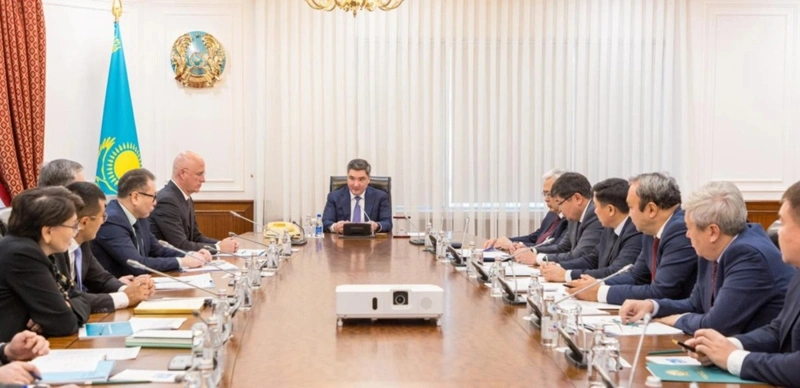Government of Kazakhstan announces anti-crisis measures to stabilize economy and protect citizens’ incomes
At the instruction of the Head of State, the Kazakh Government is implementing measures aimed at ensuring macroeconomic stability and mitigating the potential negative effects of economic reforms, Kazinform News Agency cites the Government’s press service.

Prime Minister Olzhas Bektenov chaired a meeting with members of the Government, heads of other government agencies, and relevant organizations to discuss the implementation of the President’s directive on streamlining the execution of the country’s economic reform program in the interests of its citizens.
After the meeting, the following decisions were adopted:
1. Starting from October 16 of this year, a moratorium is being introduced on any further increase in prices for AI-92 gasoline and diesel fuel until the inflation rate stabilizes. The Prime Minister instructed the Ministry of Energy, in cooperation with the Agency for Protection and Development of Competition and local authorities, to ensure strict monitoring and take measures to guarantee the uninterrupted supply of petroleum products to the domestic market.
2. Effective October 16 of this year, the increase in utility tariffs for all categories of consumers will be suspended until the end of the first quarter of 2026. Curbing tariff growth will be achieved through the optimization of operating expenses by entities classified as natural monopolies. At the same time, all scheduled maintenance and repair works on public utilities infrastructure must be completed within the established deadlines. It should be noted that a housing assistance mechanism remains in place for socially vulnerable groups. To prevent increases in prices for socially significant food products, the Government will enhance the work of stabilization funds by doubling financial support for domestic agricultural producers. This measure is expected to reduce the cost of goods included in the list of socially important food products (SIFP). Particular attention will also be given to strengthening the work of regional commissions aimed at identifying unjustified intermediaries and cases of excessive trade markups.
3. To mitigate the negative impact of the new Tax Code on small and medium-sized businesses, the Government has decided to remove excessive restrictions on the use of the special tax regime based on a simplified declaration. The prohibition list will now include only 44 types of activities, consistent with the current legislation.
Furthermore, starting January 1, 2026, tax administration will be reset to a “clean slate” approach, which will entail the following measures for micro and small businesses:
- Abolition of tax audits;
- Abolition of desk audits;
- Discontinuation of filing lawsuits seeking to invalidate transactions;
- Discontinuation of lawsuits seeking to annul business registration or re-registration.
Tax penalties and fines will be written off if the principal amount of debt is paid by April 1, 2026. Taxpayers who exceed the VAT registration threshold will not face administrative penalties.
Additionally, a simplified deregistration campaign will be launched, allowing taxpayers to voluntarily deregister with the tax and justice authorities without undergoing desk audits or tax inspections.
These measures are designed to ensure a gradual implementation of the new Tax Code and to simplify tax administration procedures for taxpayers.
4. In response to the reduction in mortgage program offerings by second-tier banks due to an increase in the base interest rate, the Government has decided to support the housing savings system. To this end, the volume of subsidized mortgage lending for the population will be doubled, ensuring greater housing affordability.
This measure will be implemented through the existing Nauryz and Nauryz-Zhumysker programs by increasing total lending capacity to 500 billion tenge. In addition, the popular Askeri Baspana (Military Housing) program will be relaunched, enabling at least 7,000 military families annually to purchase apartments on the secondary housing market.
To support these initiatives, offtake contracts will be concluded with construction companies for the development of housing projects within the framework of the aforementioned programs. In turn, developers will assume reciprocal obligations to maintain fixed housing prices for a period of three years.
5. Domestic automobile manufacturers and second-tier banks will continue to implement programs that provide financing for the purchase of passenger vehicles by the population. Additionally, a leasing mechanism for the purchase of passenger cars by individuals is being introduced to expand citizens’ access to vehicle ownership.
Furthermore, the Baiterek Holding has been instructed to promptly develop and submit proposals for additional measures to support small and medium-sized businesses.
Prime Minister Olzhas Bektenov emphasized that the reforms undertaken by the Government are aimed at ensuring long-term and sustainable economic growth, as well as strengthening the fundamental market principles within the national economy. At the same time, the Government remains firmly committed to the directives of the Head of State to improve the well-being of every citizen of Kazakhstan, viewing this as the key indicator of the nation’s economic progress.
Earlier, it was reported the National Bank of Kazakhstan raises the base rate to 18%.
